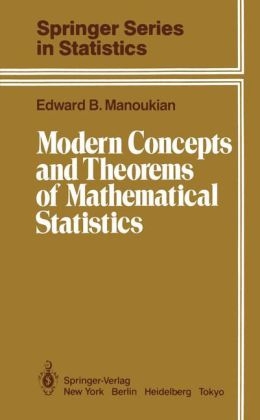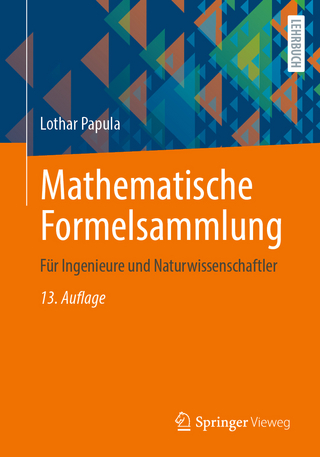
Modern Concepts and Theorems of Mathematical Statistics
Springer-Verlag New York Inc.
9780387961866 (ISBN)
- Titel ist leider vergriffen;
keine Neuauflage - Artikel merken
This allows the reader to readily verify if such conditions are indeed satisfied in most applications given in modern graduate courses without being lost in extra unnecessary mathematical intricacies. The book is not a mere dictionary of mathematical statistical terms.
1 Fundamentals of Mathematical Statistics.- 1 Basic Definitions, Concepts, Results, and Theorems.- 1.1. Probability Concepts.- 1.2. Random Samples.- 1.3. Moments.- 1.4. Some Inequalities Involving Probabilities and Moments.- 1.5. Characteristic Functions.- 1.6. Moment Generating Functions.- 1.7. Determination of a Distribution from Its Moments.- 1.8. Probability Integral Transform.- 1.9. Unbiased and Asymptotically Unbiased Estimators.- 1.10. Uniformly Minimum Variance Unbiased Estimators.- 1.11. Consistency of an Estimator.- 1.12. M-Estimators.- 1.13. L-Estimators and the ?-Trimmed Mean.- 1.14. R-Estimators.- 1.15. Hodges-Lehmann Estimator.- 1.16. U-Statistics.- 1.17. Cramer-Rao-Frechet Lower Bound.- 1.18. Sufficient Statistics.- 1.19. Fisher-Neyman Factorization Theorem for Sufficient Statistics.- 1.20. Rao-Blackwell Theorem.- 1.21. Completeness of Statistics and Their Families of Distributions.- 1.22. Theorem on Completeness of Statistics with Sampling from theExponential Family.- 1.23. Lehmann-Scheffe Uniqueness Theorem27.- 1.24. Efficiency, Relative Efficiency, and Asymptotic Efficiency of Estimators.- 1.25. Estimation by the Method of Moments.- 1.26. Confidence Intervals.- 1.27. Tolerance Intervals.- 1.28. Simple and Composite Hypotheses, Type-I and Type-II Errors, Level of Significance or Size, Power of a Test and Consistency.- 1.29. Randomized and Nonrandomized Test Functions.- 1.30. Uniformly Most Powerful (UMP), Most Powerful (MP), Unbiased and Uniformly Most Powerful Unbiased (UMPU) Tests.- 1.31. Neyman-Pearson Fundamental Lemma.- 1.32. Monotone Likelihood Ratio Property of Family of Distributions and Related Theorems for UMP and UMPU Tests for Composite Hypotheses.- 1.33. Locally Most Powerful Tests.- 1.34. Locally Most Powerful Unbiased Tests.- 1.35. Likelihood Ratio Test.- 1.36. Theorems on Unbiasedness of Tests.- 1.37. Relative Efficiency of Tests.- 1.38. Sequential Probability Ratio Test (SPRT).- 1.39. Bayes and Decision-Theoretic Approach.- 1.40. The Linear Hypothesis.- 1.41. The Bootstrap and the Jackknife.- 1.42. Robustness.- 1.43. Pitman-Fisher Randomization Methods.- 1.44. Nonparametric Methods.- 2 Fundamental Limit Theorems.- 2.1. Modes of Convergence of Random Variables.- 2.2. Slutsky's Theorem.- 2.3. Dominated Convergence Theorem.- 2.4. Limits and Differentiation Under Expected Values with Respect to a Parameter t.- 2.5. Helly-Bray Theorem.- 2.6. Levy-Cramer Theorem.- 2.7. Functions of a Sequence of Random Variables.- 2.8. Weak Laws of Large Numbers.- 2.9. Strong Laws of Large Numbers.- 2.10. Berry-Esseen Inequality.- 2.11. de Moivre-Laplace Theorem.- 2.12. Lindeberg-Levy Theorem.- 2.13. Liapounov Theorem.- 2.14. Kendall-Rao Theorem.- 2.15. Limit Theorems for Moments and Functions of Moments.- 2.16. Edgeworth Expansions.- 2.17. Quantiles.- 2.18. Probability Integral Transform with Unknown Location and/or Scale Parameters.- 2.19. ?-Trimmed Mean.- 2.20. Borel's Theorem.- 2.21. Glivenko-Cantelli Theorem.- 2.22. Kolmogorov-Smirnov Limit Theorems.- 2.23. Chi-Square Test of Fit.- 2.24. Maximum Likelihood Estimators.- 2.25. M-Estimators.- 2.26. Likelihood Ratio Statistic.- 2.27. On Some Consistency Problems of Tests.- 2.28. Pitman Asymptotic Efficiency.- 2.29. Hodges-Lehmann Estimators.- 2.30. Hoeffding's Theorems for U-Statistics.- 2.31. Wald-Wolfowitz Theorem.- 2.32. Chernoff-Savage's for R-Statistics.- 2.33. Miller's for Jackknife Statistics.- 2 Statistical Distributions.- 3 Distributions.- 3.1. Binomial.- 3.2. Multinomial.- 3.3. Geometric.- 3.4. Pascal Negative Binomial.- 3.5. Hypergeometric.- 3.6 Poisson.- 3.7. Wilcoxon's Null (One-Sample).- 3.8. Wilcoxon-(Mann-Whitney)'s Null (Two-Sample).- 3.9. Runs.- 3.10. Pitman-Fisher Randomization (One-Sample).- 3.11. Pitman's Permutation Test of the Correlation Coefficient.- 3.12. Pitman's Randomization (Two-Sample).- 3.13. Pitman's Randomization (k-Sample).- 3.14. Kolmogorov-Smirnov's Null (One-Sample).- 3.15. Kolmogorov-Smirnov's Null (Two-Sample).- 3.16. Uniform (Rectangular).- 3.17. Triangular.- 3.18. Pareto.- 3.19. Exponential.- 3.20. Erlang and Gamma.- 3.21. Weibull and Rayleigh.- 3.22. Beta.- 3.23. Half-Normal.- 3.24. Normal (Gauss).- 3.25. Cauchy.- 3.26. Lognormal.- 3.27. Logistic.- 3.28. Double-Exponential.- 3.29. Hyperbolic-Secant.- 3.30. Slash.- 3.31. Tukey's Lambda.- 3.32. Exponential Family.- 3.33. Exponential Power.- 3.34. Pearson Types.- 3.35. Chi-Square ?2.- 3.36. Student's T.- 3.37. Fisher's F.- 3.38. Noncentral Chi-Square.- 3.39. Noncentral Student.- 3.40. Noncentral Fisher's F.- 3.41. Order Statistics.- 3.42. Sample Range.- 3.43. Median of a Sample.- 3.44. Extremes of a Sample.- 3.45. Studenized Range.- 3.46. Probability Integral Transform.- 3.47. $$/bar X,/bar X - /bar Y$$.- 3.48. S12,S12/S22 and Bartlett's M.- 3.49. Bivariate Normal.- 3.50. Sample Correlation Coefficient.- 3.51. Multivariate Normal.- 3.52. Wishart.- 3.53. Hotelling's T2.- 3.54. Dirichlet.- 4 Some Relations Between Distributions.- 4.1. Binomial and Binomial.- 4.2. Binomial and Multinomial.- 4.3. Binomial and Beta.- 4.4. Binomial and Fisher's F.- 4.5. Binomial and Hypergeometric.- 4.6. Binomial and Poisson.- 4.7. Binomial and Normal.- 4.8. Geometric and Pascal.- 4.9. Beta and Beta.- 4.10. Beta and Fisher's F.- 4.11. Beta and Chi-Square.- 4.12. Beta and Uniform.- 4.13. Poisson and Poisson.- 4.14. Poisson and Chi-Square.- 4.15. Poisson and Exponential.- 4.16. Poisson and Normal.- 4.17. Exponential and Exponential.- 4.18. Exponential and Erlang.- 4.19. Exponential and Weibull.- 4.20. Exponential and Uniform.- 4.21. Cauchy and Normal.- 4.22. Cauchy and Cauchy.- 4.23. Normal and Lognormal.- 4.24. Normal and Normal.- 4.25. Normal and Chi-Square.- 4.26. Normal and Multivariate Normal.- 4.27. Normal and Other Distributions.- 4.28. Exponential Family and Other Distributions.- 4.29. Exponential Power and Other Distributions.- 4.30. Pearson Types and Other Distributions.- 4.31. Chi-Square and Chi-Square.- 4.32. Chi-Square and Gamma.- 4.33. Chi-Square and Fisher's F.- 4.34. Student, Normal, and Chi-Square.- 4.35. Student and Cauchy.- 4.36. Student and Hyperbolic-Secant.- 4.37. Student and Fisher's F.- 4.38. Student and Normal.- 4.39. Student and Beta.- 4.40. Student and Sample Correlation Coefficient.- 4.41. Fisher's F and Logistic.- 4.42. Fisher's F and Fisher's Z-Transform.- 4.43. Noncentral Chi-Square and Normal.- 4.44. Noncentral Chi-Square and Noncentral Chi-Square.- 4.45. Noncentral Student, Normal, and Chi-Square.- 4.46. Noncentral Fisher's F, Noncentral Chi-Square, and Chi-Square.- 4.47. Multivariate Normal and Multivariate Normal.- 4.48. Multivariate Normal and Chi-Square.- 4.49. Multivariate Normal and Noncentral Chi-Square.- 4.50. Multivariate Normal and Fisher's F.- 4.51. Multivariate Normal and Noncentral Fisher's F.- 4.52. Dirichlet and Dirichlet.- 4.53. Dirichlet and Beta.- Author Index.
| Reihe/Serie | Springer Series in Statistics |
|---|---|
| Zusatzinfo | biography |
| Verlagsort | New York, NY |
| Sprache | englisch |
| Gewicht | 420 g |
| Themenwelt | Mathematik / Informatik ► Mathematik ► Angewandte Mathematik |
| Mathematik / Informatik ► Mathematik ► Statistik | |
| Mathematik / Informatik ► Mathematik ► Wahrscheinlichkeit / Kombinatorik | |
| ISBN-13 | 9780387961866 / 9780387961866 |
| Zustand | Neuware |
| Informationen gemäß Produktsicherheitsverordnung (GPSR) | |
| Haben Sie eine Frage zum Produkt? |
aus dem Bereich


